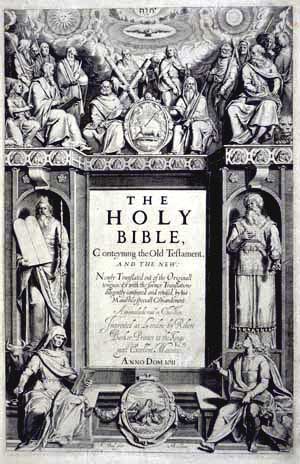The King James Bible is a touchstone of English literature. It is not the first English translation of the Bible, nor is it necessarily the best. However, it is the first universally accepted scholarly translation of the Bible, and it is the very rare balance between art and accuracy.
The language of the KJV is so gorgeous that writers such as Herman Melville, John Steinbeck, T.S. Eliot, and many others have been influenced by it. It is THE classic work of English literature.
At the same time, the translation is powerful. The methods of translation are so solid that any Bible who calls itself "standard" uses the same methods of literal translation. The KJV was called "authorized" because it was approved to be read in all the congregations of the Church of England, and later in the Episcopal church. And rightly so. The scholars had to balance the 17th century battle between the formal Anglicans and the Calvinist Puritans. Other translations of the Bible were rebelliously Protestant or Puritan. But the KJV scholars had no axe to grind. Instead, they were interested in simple objectivity and beauty.
I rarely use the KJV myself because the language is antiquated, and sometimes misunderstood. Some of the difficult passages are famously misused, such as "Abstain from every appearance of evil." This has been used to restrict people from seeming evil, which Jesus himself could not avoid. The original translation meant, "stay away from doing evil", not seeming like doing evil as our modern understanding of "appearance" means.
Although the KJV's usefulness is limited compared to its original use, it is still a powerful and effective two edged sword. We still read its version of the Lord's Prayer, the classic text of Psalm 23 and the beautiful version of I Corinthians 13. Their translations of the Psalms have never been matched in power and language (it is rumored that Shakespeare helped with the translation of Psalms).
We should take time to read the KJV again, or at least portions of it, to remind us of this most influential English text.
My God, my God, why hast thou forsaken me? why art thou so far from helping me, and from the words of my roaring?
O my God, I cry in the daytime, but thou hearest not; and in the night season, and am not silent.
But thou art holy, O thou that inhabitest the praises of Israel.
Our fathers trusted in thee: they trusted, and thou didst deliver them.
They cried unto thee, and were delivered: they trusted in thee, and were not confounded.
But I am a worm, and no man; a reproach of men, and despised of the people.
All they that see me laugh me to scorn: they shoot out the lip, they shake the head, saying,
He trusted on the LORD that he would deliver him: let him deliver him, seeing he delighted in him.
But thou art he that took me out of the womb: thou didst make me hope when I was upon my mother's breasts.
I was cast upon thee from the womb: thou art my God from my mother's belly.
Be not far from me; for trouble is near; for there is none to help.
(Psa 22:1-11 KJV)

No comments:
Post a Comment